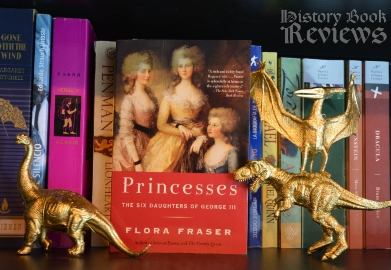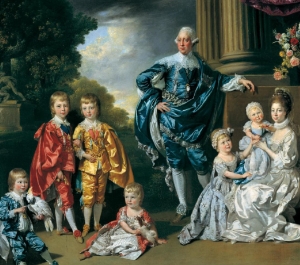Princesses: The Six Daughters of George III
by Flora Fraser

Review
When thinking of 18th century Georgian princesses, what comes to mind is beauty, opulence, voluminous satin gowns, airy palaces filled with elegant courtiers, and frivolity. Also powdered wigs and, for some reason, syphilis. But that was not at all the reality of life for the six daughters of King George III, princesses of England during the late 1700's and early 1800's. Charlotte (Princess Royal), Augusta, Elizabeth, Mary, Sophia and Amelia led difficult, often tragic lives of loneliness, loss, and illness in one of the most modest and unassuming royal courts in English history.
Princesses, the story of their lives by Flora Fraser, taught me a lot that I didn't know about this time period in royal history and I thought the book was very well-researched. There was a genuine note of sympathy and admiration for the girls throughout the text, which I really appreciated. For all these qualities, and because of the text layout and font (I know I'm weird, but that's an important part of a book's appeal for me), I wanted so badly to like Princesses. However, like Princess Amelia in her goal to marry her secret boyfriend before dying of tuberculosis, I failed.
It pains me to say anything negative about this book or about Flora Fraser, because I can tell that both had the best possible intentions. Also I have to clarify, the book is not bad!! It just had a number of things that hung me up enough to the point that I couldn't really enjoy reading it. One of these things is the amount of quotations used. Normally I love it when authors use quotations from a historical subject's own letters or diaries, because it gives that person a voice and lets them speak for themselves. But in this case there were SO many quotes that it was distracting, and there was not enough of a narrative behind the quotes to keep the storyline cohesive. Fraser also has a habit of embedding sentences within sentences, sometimes complex enough that I had to re-read the section several times before understanding what she was actually saying. I know there is a grammatical term for this from my Latin studies but I can't find what it is. All I know is that Cicero, the Roman orator, did it and some of his sentences were multiple pages long, making me very 'iratus' in Latin class.

George III with his family in the early years...only six out of 15 have spawned yet.
My other main hang-up with this book is that while there was a lot of detail on what the princesses did, where they went, who they wrote to, etc., there was never a good sense of who they were, what they felt or how they experienced life. Overall, for me, the book just didn't do justice to the lives and hearts of these six royal girls. I can't imagine how difficult it must be to try to write a single biography of multiple individuals, so I don't know that it could have been done better. But ultimately, Princesses felt very disjointed to me, skipping around in time and perspective to cover all the sisters equally while capturing none of them successfully. It painted a beautiful and sad picture, but the picture was two-dimensional.
That being said, this book was very successful at introducing this time period and these historical characters to someone who knew very little about them. The princesses grew up rather humbly (for princesses) because their father George III wanted the life of a country gentleman instead of that of a king. They loved their father deeply and were devastated by his unexplained bouts of severe mental illness (perhaps porphyria?), which contributed to possibly their greatest woe: Spinsterhood. They longed to marry and have families of their own, as well as to escape the company of their mother. She was kind of a beast, though I will say that after bearing 15 children I can't really blame her for this. The princesses were plagued by illness (in other sources this is connected with the supposed hereditary condition of porphyria, though this is hardly discussed by Fraser...for more on this, read Purple Secret!) and dogged by rumors of illegitimate children, affairs, and even incest. Though a few of them did eventually marry later in life, none of them ever had any children (unless you count the hypothetical illegitimates, in which case Sophia may have had one) and they doted on their nieces and nephews for the rest of their lives. They had surprisingly few given that they had 9 brothers, most of whom lived to adulthood and were married. They also watched almost all those brothers die before them...Poor lonely dears.
Overall I was disappointed with the rather flat portrayal of the princesses in this book. I have found that almost every single historical character I have ever read about is fascinating to me when their experiences, motives, and actions are truly explored, and this was not done well in Princesses. Charlotte, Augusta, Elizabeth, Mary, Sophia and Amelia came across almost boring to me in this book, and that shouldn't be the case. These were six complex women who lived in privileged circumstances in the late 18th century, who endured real hardship and pain in their family lives, who craved love and companionship deeply, who suffered and were still kind, and who had an inexplicable penchant for accidentally lighting themselves on fire. What could be less boring than that!?!?



